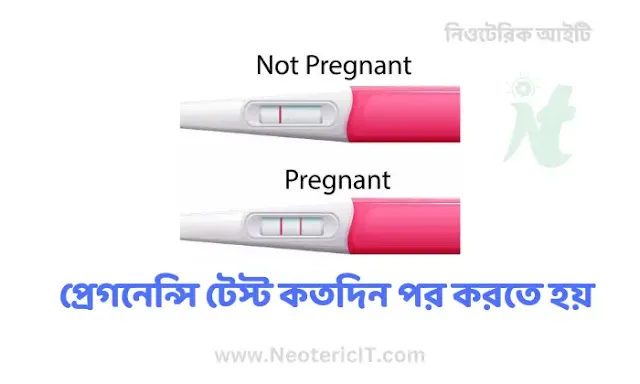After how many days to do the pregnancy test Pregnancy test rules? - pregnancy test
Hello dear guest - Welcome to Neoteric IT . You have come to Neoteric IT for information about After how many days to do the pregnancy test Pregnancy test rules? - pregnancy test Today I will conclude this article by discussing After how many days to do the pregnancy test Pregnancy test rules? - pregnancy test in detail. Search Google to know more about After how many days to do the pregnancy test Pregnancy test rules? - pregnancy test write After how many days to do the pregnancy test Pregnancy test rules? - pregnancy test or click here insightflowblog.com for visit. See the page Table of content for know the main topic of this article. Web story and AMP Version
Are you wondering if you are pregnant? Maybe you're trying to conceive or you're worried about a missed period. Whatever the reason, a pregnancy test can bring clarity and peace of mind. But when should you take a pregnancy test and how do you do it correctly? In this article, we will explain the pregnancy test in detail so that you can feel confident in your results.
How long to take a pregnancy test - Pregnancy test rules - pregnancy test - NeotericIT.com
When to Take a Pregnancy Test
The timing of the pregnancy test is very important for accurate results. If you do a test too early, it won't be able to detect the pregnancy hormone, human chorionic gonadotropin (hCG), which is produced by the placenta after fertilization. Here are some guidelines for when to take a pregnancy test:
Wait until you miss your period : Most pregnancy tests claim to be 99% accurate on the first day of a missed period. But waiting a few more days will increase the accuracy of the test.
Use your longest menstrual cycle as a guide: If you have irregular periods, knowing when to take a pregnancy test can be challenging. In this case, use your longest menstrual cycle as a guide. For example, if your longest cycle was 35 days, wait until at least day 36 to take a test.
Countdown to Ovulation: If you know when you ovulated, you can count from that date to determine when to test. Most women ovulate on day 14 of their menstrual cycle, but this can vary. A pregnancy test taken 14 days after ovulation is usually accurate.
Follow Fertility Treatment Guidelines: If you are undergoing fertility treatment such as in vitro fertilization (IVF), your doctor will give you instructions on when to take a pregnancy test. Usually, you will wait two weeks after the embryo transfer before the test.
How to take a pregnancy test
Now that you know when to take a pregnancy test let's discuss how to do it the right way. Here are some steps to follow:
Choose the right test: There are two types of pregnancy tests: urine test and blood test. Urine tests are the most common and can be done at home or in a clinic. Blood tests are more sensitive and can detect pregnancy before a urine test, but they must be done in a lab by a healthcare provider.
Read the instructions carefully: Every pregnancy test is different, so it is important to read the instructions carefully before starting the test. Make sure you know how long to wait for the results and how to interpret them.
Collect urine properly: If you are taking a urine test, make sure you collect your urine properly. The best time to test urine is in the morning when your urine is concentrated. Use a clean cup to catch your urine and then dip the testing stick into the cup for the specified amount of time.
Wait for the results: After collecting your urine, you need to wait for the results. Depending on the test, this can take anywhere from a few minutes to a few hours. Be patient and don't read the results too quickly, as this may lead to wrong results.
Interpret the results properly: Once the testing time is over, it is time to interpret the results. Most tests will use two lines (one for control and one for positive) or a plus sign and minus sign. If you see a positive result, congratulations! You are probably pregnant. If you see a negative result, it's possible that you took the test too early, so wait a few days and try again.
How many days after a missed period to take a pregnancy test?
A missed period is often the first sign of pregnancy, but it is not always a reliable indicator. Many factors can cause missed or delayed periods, including stress, illness, weight changes, hormonal imbalances, and medications. Therefore, it is essential to confirm your pregnancy with a pregnancy test.
The timing of a pregnancy test after a missed period is very important as it affects the accuracy of the results. If you take the test too early, it may give you a false negative result, meaning you are pregnant, but the test doesn't detect it yet. Here are some guidelines for how many days after a missed period you should take a pregnancy test:
Wait at least a week: If you have missed your period and are sexually active, wait at least a week before taking a pregnancy test. This will give your body enough time to produce detectable levels of hCG in your urine, the hormone produced by the placenta after fertilization.
Wait until the day of your expected period: Most pregnancy tests claim to be 99% accurate on the first day of a missed period, but waiting until the day of your expected period will increase the test's accuracy. For example, if you have a regular 28-day menstrual cycle and don't get your period on day 29, take a pregnancy test.
Use a sensitive pregnancy test: Some pregnancy tests are more sensitive than others and may detect lower levels of hCG in your urine. If you're worried about whether you're pregnant or have irregular periods, consider using a sensitive pregnancy test that can detect hCG up to five days before you miss it.
Take a blood test: A blood test can detect pregnancy before a urine test because it measures the exact amount of hCG in your blood. However, blood tests require a healthcare provider to draw your blood and may take longer to get results than urine tests.
How many days after intercourse to take a pregnancy test?
The time it takes for a fertilized egg to implant in the uterus and for your body to start producing the pregnancy hormone, hCG, varies from woman to woman. As a result, the timing of taking a pregnancy test after intercourse depends on when you ovulated, whether you had sex during your fertile window, and how sensitive the test is to detecting hCG.
Here are some guidelines for how many days after intercourse you should take a pregnancy test:
Wait until a missed period: If you're trying to conceive and have missed a period, wait at least one week after the date of your missed period before taking a pregnancy test. At this point, if you are pregnant, hCG levels in your urine will be high enough to register on most pregnancy tests.
Use ovulation tracking to estimate implantation: If you're actively trying to conceive, track your ovulation with an app or fertility monitor to estimate when implantation might occur. Implantation usually occurs 6 to 10 days after ovulation. After implantation, your body will start producing hCG, so you can take a pregnancy test a few days later to make sure you are pregnant.
Wait two weeks after intercourse: In general, it is best to wait at least two weeks after unprotected sex to take a pregnancy test. This will give your body enough time to produce detectable levels of hCG in your urine, the hormone produced by the placenta after fertilization.
Use a sensitive pregnancy test: Some pregnancy tests are more sensitive than others and may detect lower levels of hCG in your urine. If you're worried about knowing if you're pregnant or want to test two weeks before intercourse, consider using a sensitive pregnancy test that can detect hCG up to five days before your expected period.
Pregnancy can be understood after how long
Pregnancy is usually understood after a certain period of time has elapsed since conception. Generally, the most reliable way to confirm pregnancy is with a pregnancy test, which detects the presence of a hormone called human chorionic gonadotropin (hCG) in a woman's urine or blood.
Pregnancy can be understood after 10 days of missed period
A missed period is often one of the first signs of pregnancy, and many women choose to take a pregnancy test at this time. In general, it is recommended to wait at least 10 days after a missed period before taking a pregnancy test, as this provides enough time for hCG levels to rise to detectable levels. However, some pregnancy tests claim to be able to detect pregnancy earlier, sometimes up to six days before a miss.
Pregnancy test with toothpaste
Although there are many myths and old wives' tales about alternative methods of detecting pregnancy, such as using toothpaste or shampoo, these methods have not been proven to be reliable or accurate. The stick pregnancy test is the most common and reliable type of home pregnancy test. They usually work by detecting hCG in a woman's urine through the use of a colored line or symbol. It is important to follow the instructions provided with the test carefully to ensure accurate results.
How many days after a missed period can you be pregnant?
Pregnancy test with shampoo
Rules for doing pregnancy test with stick
In general, the rules for using a stick pregnancy test include following the instructions provided with the test, collecting the urine sample in a clean and sterile container, and waiting an appropriate amount of time before interpreting the results. It is important to note that a positive pregnancy test result should always be confirmed by a healthcare provider with additional testing, such as a blood test or ultrasound.
Conclusion
Taking a pregnancy test can be an exciting and nerve-wracking experience. To ensure accurate results, wait until you miss, use your longest menstrual cycle as a guide, count from ovulation or follow fertility treatment guidelines. While taking the test, choose the correct one and read the instructions carefully. Collect your urine properly, wait for the results and interpret them properly. With these steps, you can feel confident in your pregnancy test results.
Thanks for read the post. You can also read the article in bangla - pregnancy-test
You are indeed a valued reader of Neoteric IT. Thank you so much for reading After how many days to do the pregnancy test Pregnancy test rules? - pregnancy test article. Please let us know how you feel after reading this article.

 Follow Google News to get the latest Neoteric IT news
Follow Google News to get the latest Neoteric IT news 
.png)





Please comment in accordance with the policy - otherwise your comments will not be accepted.
comment url